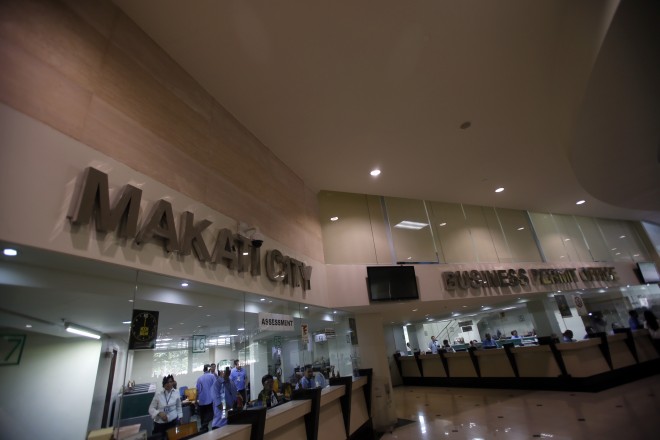
Ground Floor of the Makati City Hall Building II. NIÑO JESUS ORBETA
MANILA, Philippines–The South Luzon Tollway Corporation, now SMC SLEX, Inc., is entitled to a refund of more than P20.5-million from the Makati City government after the Supreme Court (SC) affirmed the Tax Court’s ruling regarding erroneously collected business tax in 2011.
In a resolution by the Supreme Court’s Third Division made public last Jan. 16, it dismissed the petition filed by the Makati City government and its treasurer, saying the court could not see any reason to disturb the findings of the Court of Tax Appeals (CTA).
The South Luzon Tollway Corporation previously had its office in Makati until 2011, when it moved to Calamba, Laguna.
In Aug. 3, 2011, South Luzon applied for a certificate of business retirement with Makati. It was assessed with local business tax from January 1 to September 30, 2011 of P20,585,603.19. The amount was paid on January 2012.
A year later, South Luzon, now SLEX, asked Makati City for a refund, saying that it was registered as a pioneer enterprise with the Board of Investments (BOI) on March 3, 2010, making it exempt from paying said tax for six years, or from March 3, 2010 to March 3, 2016. It submitted its BOI certificate of registration.
Due to inaction on the part of the local government, it filed a petition with the Calamba City regional trial court (RTC) to declare it exempt from local business tax and for a refund of the amount it paid for the 2011 taxes. The court ruled on its favor.
Makati City filed a motion for reconsideration, which was denied prompting it to take the case to the CTA. But the CTA’s first division affirmed the lower court’s ruling and the CTA’s en banc.
The CTA, in full court, also declared as denied Makati City’s claim that if the taxes were found to be erroneously or illegally collected, South Luzon could only be granted tax credits. The city then took its case to the SC.
However, the SC said, “the petition lacks merit.”
The SC said it recognizes the expertise of the CTA in handling tax cases, saying “its conclusions will not be overturned unless there has been an abuse or improvident exercise of authority.”
In this case, the SC said it could not find any reason to disturb the findings of the CTA.
It added that the claim for a refund made by South Luzon was seasonably filed within the two-year mandated period.
It explained that the two-year period to file an action for a refund expired on Jan. 31, 2014 or 24 months from the day of payment on Jan. 31, 2012. However, Jan. 31, 2014, was declared a non-working holiday and Feb. 1 and 2, 2014, were Saturday and Sunday, respectively.
Therefore, the court said South Luzon’s filing of a petition for a refund before the RTC on Feb. 3, 2014, was within the prescriptive period set by law.
It added that the failure to present the BOI Certificate of Registration at the time of payment of local business tax was not fatal to South Luzon’s case.
It does not constitute a waiver to recover the tax erroneously collected and paid.”
On whether South Luzon is entitled to tax credit, the SC said the Revised Makati Revenue Code (RMRC) provides an option for any recovery of erroneously or illegally collected tax–either refund or credit.
“As correctly pointed out by the CTA En Banc, the use of the disjunctive ‘or’ expresses an alternative or choice; it signifies dissociation and independence of one thing from other things enumerated,” it said.
“That said, respondent is entitled to be refunded of the P20,585,603.19 it paid to petitioners (Makati City), in cash, contrary to petitioners’ asseveration that respondent may only avail of a tax credit,” the SC said.
it pointed out.
The SC also issues a reminder that taxpayer expects fair dealing from the government.
“If the State expects its taxpayers to observe fairness and honesty in paying their taxes, it must hold itself against the same standard in refunding excess (or erroneous) payments of such taxes. It should not unjustly enrich itself at taxpayers’ expense,” the SC said.
RELATED STORY:
Muntinlupa wants SLEx, Skyway to pay business tax, other fees